Key takeaways:
- Selective mutism is an anxiety disorder that inhibits communication in specific social settings, leading to feelings of isolation for those affected.
- Developing social skills is essential for building connections, confidence, and emotional well-being, particularly for individuals with selective mutism.
- Engaging in low-pressure environments and seeking feedback can facilitate growth in social skills, allowing for improved interactions and relationships.
- Understanding non-verbal communication and practicing empathy enhances interactions and fosters deeper connections with others.
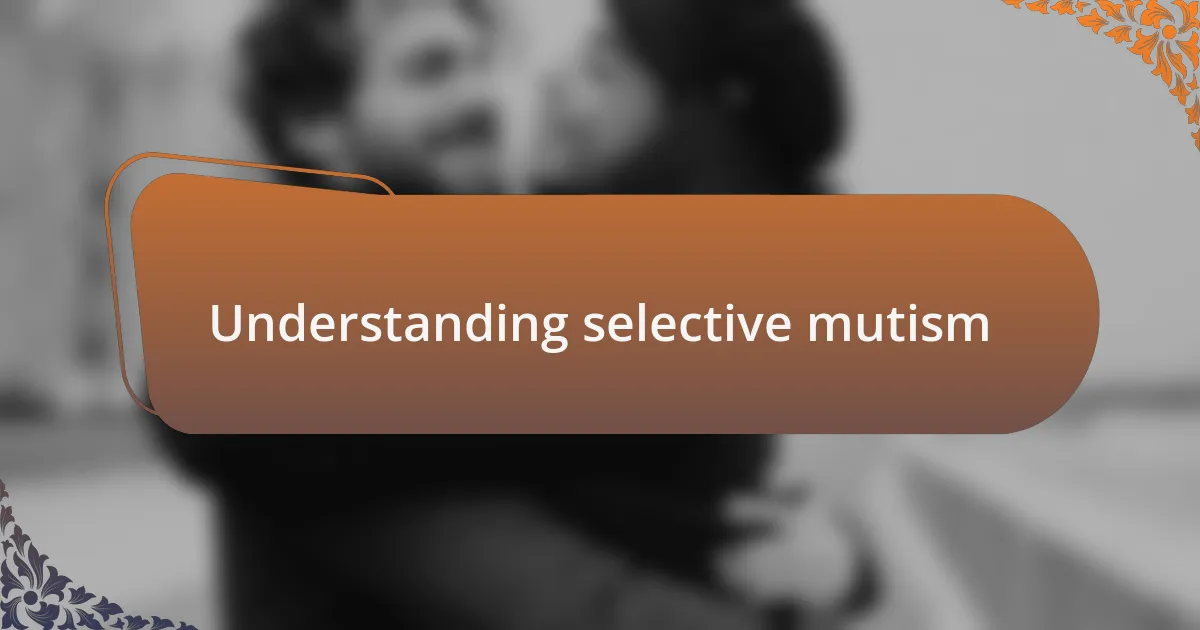
Understanding selective mutism
Selective mutism is more than just shyness; it is an anxiety disorder that affects a person’s ability to speak in specific social situations. I remember the first time I witnessed its impact when a young girl at a family gathering sat silently, her eyes darting around the room filled with relatives. It made me wonder, what is it like to feel trapped in your own mind, wanting to speak yet feeling an overwhelming barrier?
The silence surrounding selective mutism can be deafening. I have spoken with parents who describe their child’s struggle as heartbreaking—a brilliant mind full of thoughts and emotions, yet unable to share them with others. How many stories remain untold because of this condition? This realization deepens my understanding of the challenges those with selective mutism face daily, living in a world where their voice is not easily heard.
In many cases, selective mutism can manifest in different environments. I recall a discussion with a teacher who shared how a student would participate fully in class discussions yet become mute during lunch with classmates. This dichotomy highlights the complexity of the disorder and raises an important question: How can we create environments that feel safe for those grappling with this struggle? Understanding selective mutism requires not just awareness but compassion and effective strategies to empower those affected.
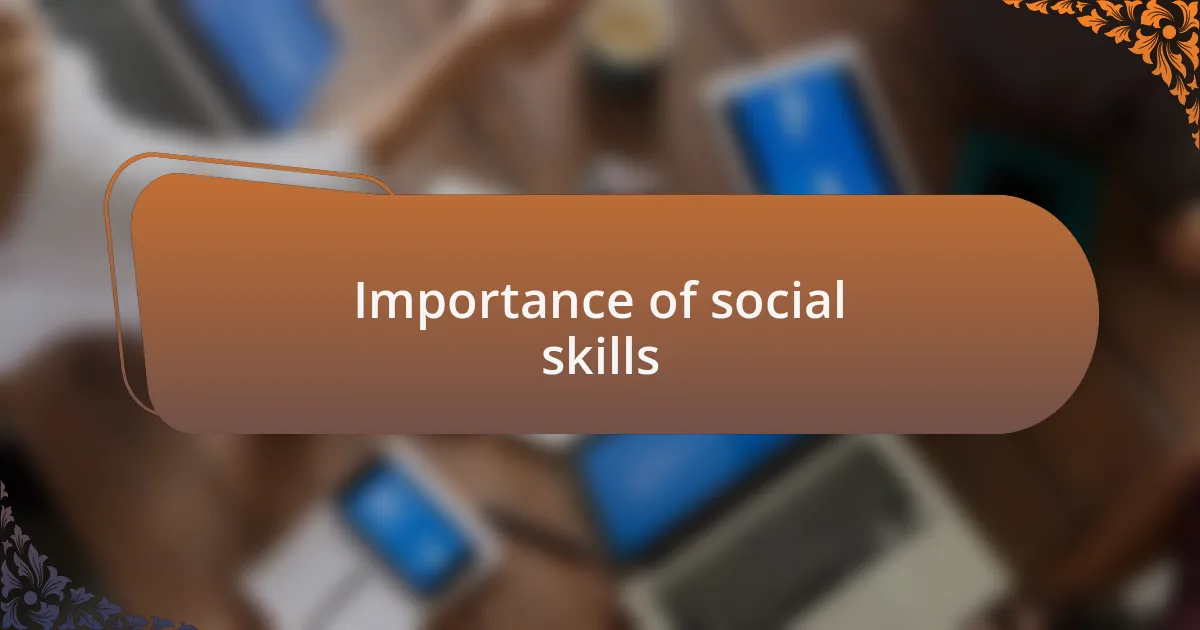
Importance of social skills
Social skills are vital for building connections and fostering relationships. I once watched a young boy struggle to initiate conversations during playtime; it reminded me of how crucial small interactions are for developing confidence. Without these skills, individuals, especially those with selective mutism, may feel isolated, missing out on the warmth of companionship.
In my experience, effective communication is the foundation of social interaction. I often reflect on my own childhood when I hesitated to speak up, but each small success—like exchanging greetings—helped me grow. Imagine how much could change for someone with selective mutism if they could navigate these social nuances without fear or anxiety.
The emotional weight of lacking social skills can be profound. It’s not just about missing out on conversations; it’s about feeling disconnected from the world around us. I think back to times when a simple smile or nod made a difference in someone’s day and can’t help but wonder: what if every person had the tools to unlock that potential, regardless of their challenges?
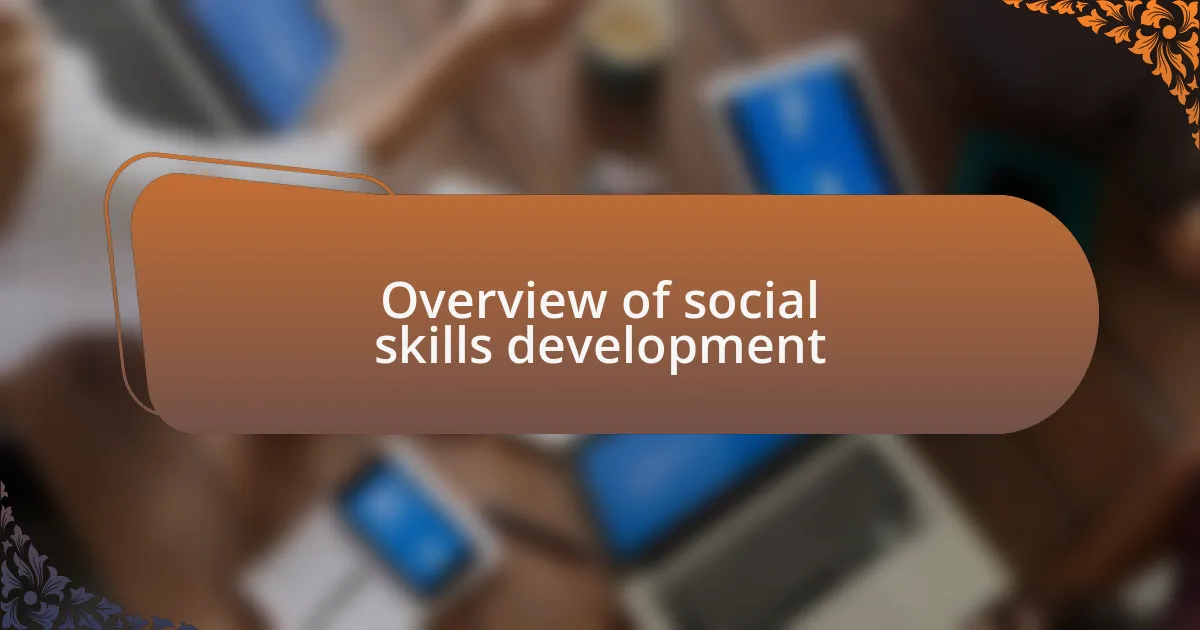
Overview of social skills development
Developing social skills is a gradual and often complex journey. I can recall a moment at a school event where I hesitated to join a group discussion. Watching others engage so effortlessly made me realize that these interactions often begin with observation and mimicry. The more we see and practice, the more natural it becomes.
It’s intriguing how social skills encompass a wide range of behaviors, from eye contact to turn-taking in conversations. I remember when I started paying attention to non-verbal cues—like how a friend’s smile could invite me into a conversation. It’s these subtle signals that create a richer social tapestry, allowing individuals to connect beyond just words.
Every small victory in social interactions builds a foundation for greater confidence. I often reflect on those small exchanges in my life that made me feel seen and heard; whether it was sharing laughter with a friend or helping someone feel included. How empowering would it be if everyone could experience that sense of belonging? Developing and honing these skills is not just essential; it can transform lives, especially for those facing social challenges.
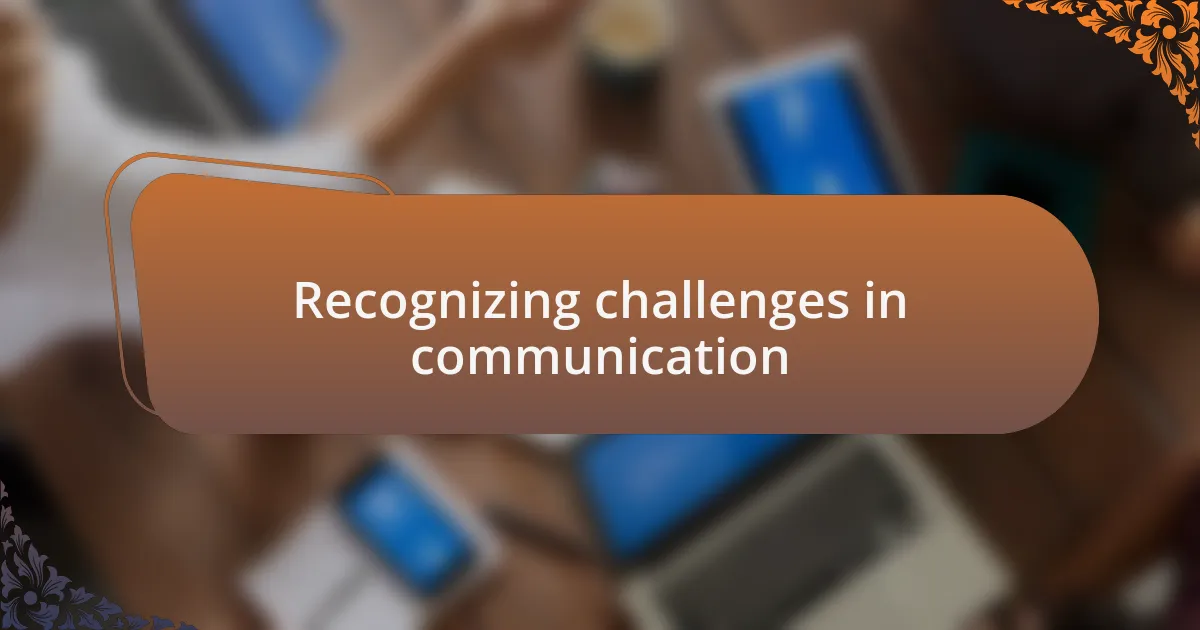
Recognizing challenges in communication
Recognizing challenges in communication can often be the first step toward finding solutions. I remember sitting in a classroom, feeling invisible during group discussions, where my peers seemed to communicate with such ease. It struck me how daunting it can be to navigate situations where your voice feels stifled, leaving you longing for connection but trapped in silence.
There are times when I have misinterpreted cues, such as when a friend waved but I hesitated to respond because fear held me back. This experience taught me the importance of understanding that everyone has different styles of communication. Have you ever found yourself wishing you could convey your feelings more clearly? It’s moments like these that highlight the intricate relationship we have with our social skills.
Sometimes, it feels like those challenges in communication aren’t just about finding the right words but also about overcoming internal barriers. I often felt a rush of anxiety before speaking up, as if my heart was racing against my thoughts. Recognizing these feelings as a common hurdle among many can be liberating, allowing for a process of compassion and growth as we learn to express ourselves more freely.
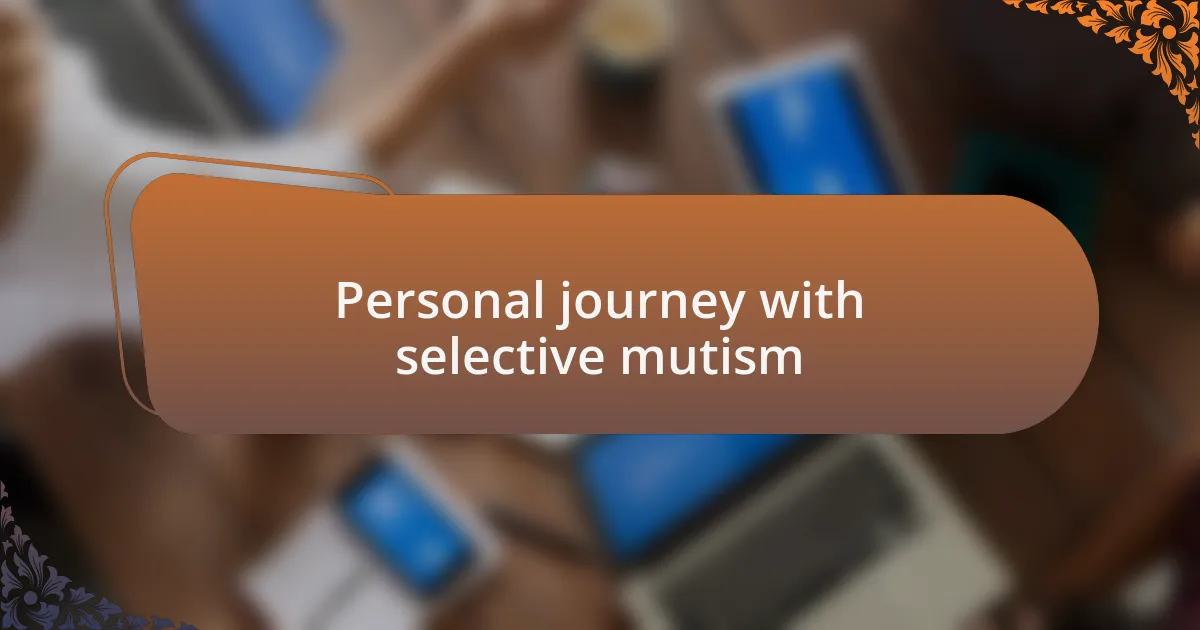
Personal journey with selective mutism
I recall one pivotal moment at a family gathering where everyone was engaged in lively conversation while I sat silently on the sidelines. As stories and laughter floated around me, I felt an intense wave of longing to join in, but my tongue felt tied. This experience highlighted not only the struggle of speaking up but also the emotional toll of wanting to connect yet feeling like an outsider.
There were days when I would leave social events feeling defeated, thinking, “Why can’t I just speak like everyone else?” The weight of that question sat heavily with me. It became clear that my journey was not just about breaking the silence but also about embracing the discomfort and fear that came with it. Understanding my selective mutism was a big part of my growth; I began to see my silence not as a flaw but as a unique part of my communication style.
Reflecting on those times, I realized that learning to navigate social skills required patience and empathy—not just for myself, but for others too. Have you ever felt like everyone around you is thriving, while you’re grappling with your own voice? This realization was empowering; it pushed me to explore different ways of communicating, whether through writing, art, or finding supportive spaces where I could express my thoughts without judgment. Each small step forward was a triumph that reinforced my belief in the power of connection, however it may come.
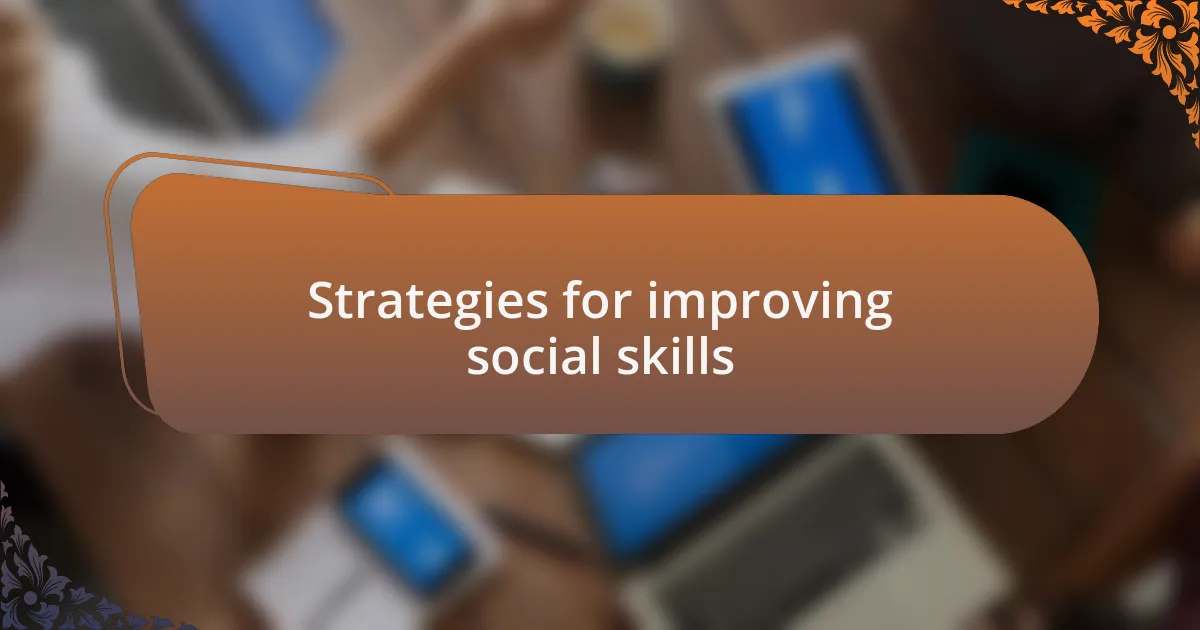
Strategies for improving social skills
Engaging in social skills development often starts with practicing in low-pressure environments. I remember attending a supportive communication workshop where we could role-play different social scenarios. It felt liberating to rehearse greetings and small talk with others who understood my struggle. Have you ever felt the comfort of connecting with people who simply get it? That shared experience made trying out my social skills feel less daunting.
Another effective strategy I found was seeking feedback from trusted friends or family members. After a challenging social interaction, I would discuss it with a supportive family member who could offer constructive insights. This created a safe space for me to reflect on what worked and what didn’t. It made me realize that every missed opportunity was merely a stepping stone toward improvement—an important lesson in resilience and growth.
Finally, I practiced active listening as a way to strengthen my social connections. By focusing on what others were saying instead of my internal fears, I discovered a newfound sense of engagement. Have you noticed how truly tuning in can sometimes ease the pressure of speaking? This shift allowed me to form deeper bonds and share moments of genuine understanding, proving that social skills are not just about speaking but also about how we connect with those around us.
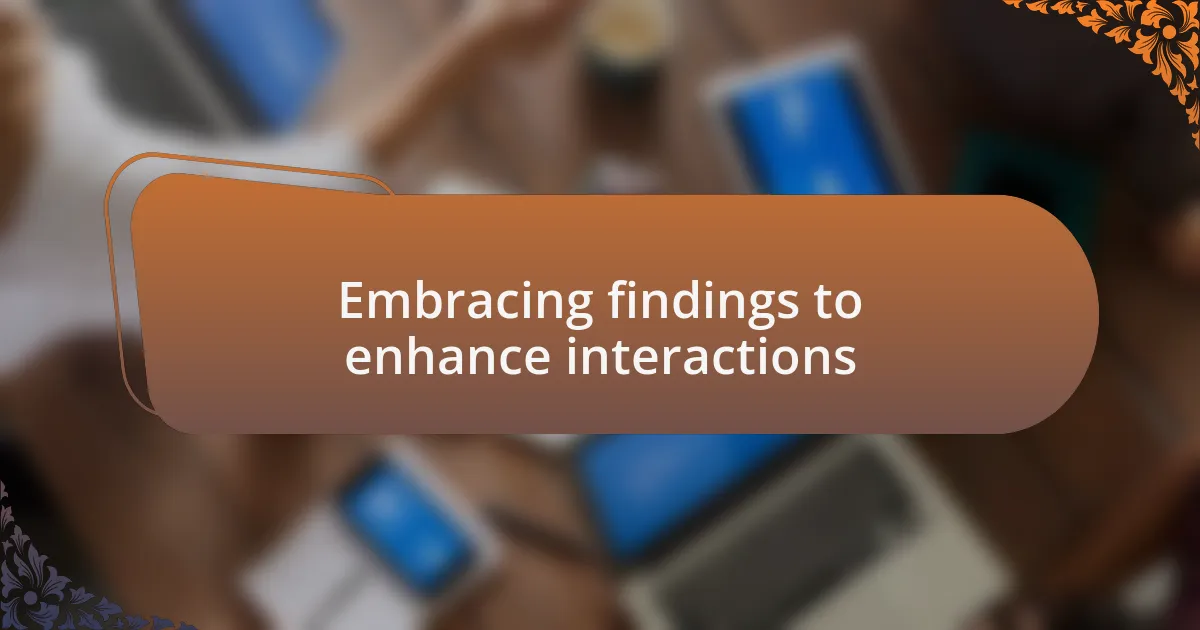
Embracing findings to enhance interactions
Embracing findings on social skills can be a transformative journey. I recall a moment during a group therapy session when we analyzed research on body language and non-verbal cues. It was eye-opening to realize how much we communicate without words. Have you ever noticed how just a smile can change the mood of a conversation? Understanding these nuances helped me adapt my interactions, making them feel more natural and inviting.
One particular study I came across highlighted the importance of social mirroring—subtly mimicking another person’s gestures or expressions. I began to try this technique, and I remember a time when I mirrored a friend’s laugh during a coffee chat. It sparked an instant connection and made the conversation flow effortlessly. Wouldn’t you agree that finding subtle ways to connect can create a warm atmosphere? Through these experiences, I learned that embracing such findings isn’t just about implementing strategies; it’s about enriching our shared human experience.
I also stumbled upon research emphasizing the value of empathy in conversations. After reading about it, I started to consciously practice stepping into others’ shoes. There was a poignant moment when a friend shared their struggles, and rather than jumping in with advice, I simply listened. This shift in my approach fueled a deeper appreciation for their perspective. Isn’t it fascinating how leaning into empathy can enhance our interactions? By embracing these insights, I found that interactions became more meaningful, paving the way for deeper connections.